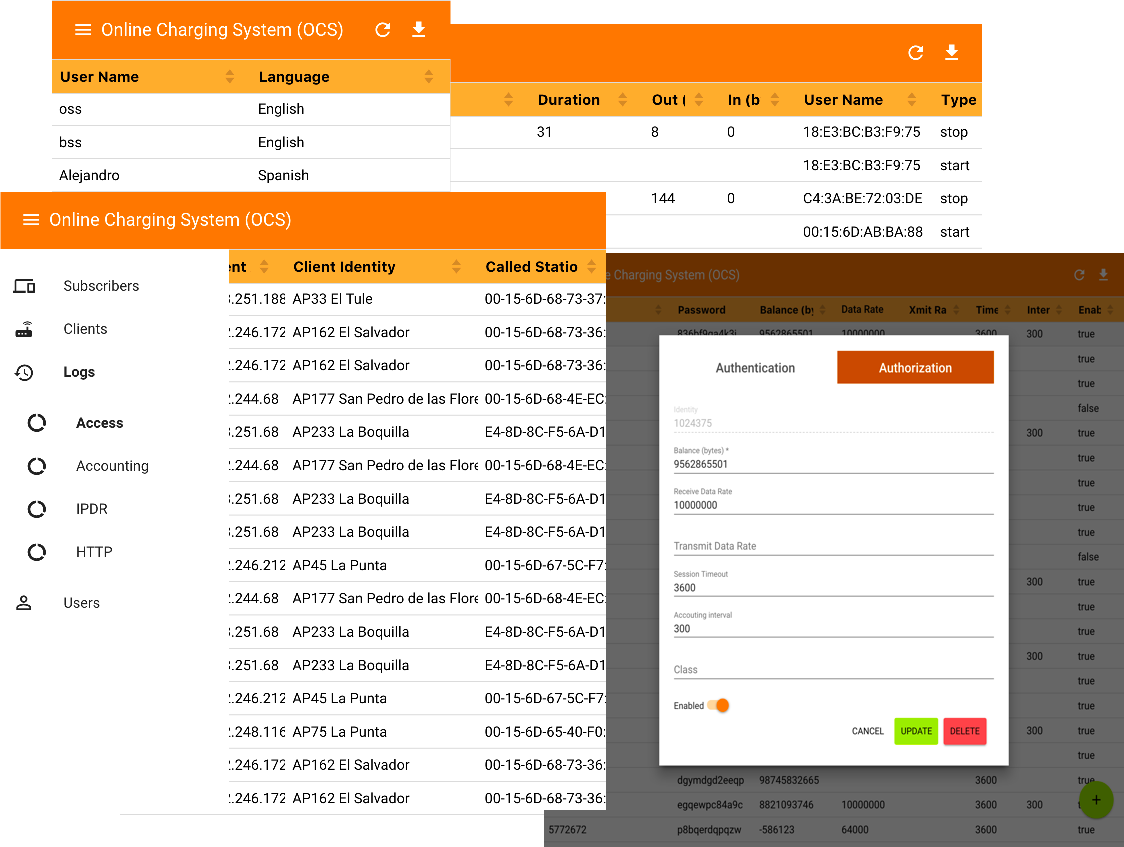SigScale Online Charging System (OCS)
Prebuilt packages available for Ubuntu, Debian and Docker.
FAQ
HOWTO
Open Issues
Create Issue
This application implements functions used by communications service providers (CSP) for authorization and charging of prepaid services. It is built to TM Forum standards with Open APIs for management of product, service and balance. A web components front end is also provided for standalone use.
Authentication, authorization and accounting (AAA) functions are the foundation to commercial operations of a CSP. Subscriber credentials may (optionally) be stored internally with authentication performed over DIAMETER/RADIUS using EAP methods (AKA/AKA', PWD, TTLS) or managed by an external AAA (e.g. 3GPP HSS).
An Online Charging System (OCS) performs real-time charging for services. An OCS authorizes subscribers' sessions subject to available credit on account and decrements account balance as services are consumed. When a subscriber's account balance is depleted authorization may be withdrawn and ongoing session(s) terminated.
A Policy Control and Charging Rules Function (PCRF) encompasses policy control decision and flow based charging control functionalities. The PCRF provides network control regarding the service data flow detection, gating, QoS and flow based charging,
This application conforms to 3GPP specifications for the interfaces, protocols and procedures of the OCS, PCRF, HSS and 3GPP AAA Server functions in the reference architecture.
| Interface | Description |
|---|---|
| GUI | Polymer Web Components |
| REST | TM Forum Open APIs |
| CLI | Erlang API |
| RADIUS | AAA NAS Clients |
| DIAMETER | 3GPP Ro/Gy/Wo,Gx,SWm/STa,SWx,S6a,S6b |
| SNMP | Performance Management |
| EAP-PWD | Android, Linux |
| EAP-TTLS | Android, Linux, Apple, Windows |
| EAP-AKA | Android, Linux, Apple |
| EAP-AKA' | Android, Linux |
| IPDR | Billing Record Files |
A web front end built with Google Polymer
web components for
material design
provides simple guided management of Product Offerings & Prices, Subscribers,
Balance Buckets and NAS clients. Provisioning common authorization attributes
as well as viewing usage and access logs is supported. Uses REST APIs exclusively.

The GUI provides a comfortable interface for administration however most CSPs shall want to integrate Operations & Business Support Systems (OSS/BSS) using machine-to-machine APIs.
Most aspects of provisioning and operations may be performed through integration using an HTTP RESTful interface. Specifically the TM Forum Open APIs are supported including: Product Catalog, Product Inventory, Prepay Balance, Service Inventory, Resource Inventory and Usage Management.
All aspects of provisioning, operations and maintenance may be performed using the Erlang public API, either manually on the command line shell, or through custom Erlang module development.
SigScale OCS supports the DIAMETER applications for the 3GPP interfaces of an OCS (Ro/Gy/Wo) (3GPP 32.299), PCRF (Gx), HSS (S6a) and AAA Server (STa/SWm/SWx/S6b), The OCS function supports Session Charging with Unit Reservation (SCUR) and Event Charging with Unit Reservation (ECUR) in CS, PS and IMS domains with both centralized and distributed unit determination. Non-3GPP access is supported with for ePDG with either internal HSS or proxy over SWx to external HSS.
The OCS acts as an authentication, authorization and accounting (AAA) server for network access servers (NAS) using the RADIUS protocol such as wireless local area network (WLAN) access points (AP), broadband remote access server (BRAS) or broadband network gateway (BNG).
A Simple Network Management Protocol (SNMP) agent is included which allows a Network Management System (NMS) to interogate the Management Information Bases (MIB) supported including RADIUS and DIAMETER MIBs.
A NAS may request authentication from the AAA server for subscribers attempting access. The OCS may authorize access and provide specific service authorization information (i.e. data rate, class, session expiry time). In a 3GPP context an external Home Subscriber Server (HSS) may provide AAA with or without proxy through SigScale AAA.
A NAS may send accounting requests to the OCS (AAA server) at the end of a session and optionally at intervals during an ongoing session. The OCS logs usage records for offline billing and reporting and performs real-time credit management, updating subscriber account balances. The OCS may send a disconnect request to a NAS when an interim update depletes all available balance or when a subscriber has been disabled administratively.
The Extensible Authentication Protocol (EAP) is an authentication framework which supports multiple authentication methods. In a WLAN (Wi-Fi) use case an EAP peer (supplicant) in a device (e.g. laptop or smartphone) sends EAP over LAN (EAPoL) to the AP (NAS) which tunnels the EAP over RADIUS to the OCS (AAA server). An EAP authentication method (e.g. AKA', PWD, TTLS) is negotiated and the peer authenticates directly with the OCS.
The AKA/AKA' methods authenticate using the credentials (K/OPc) stored on the USIM of a mobile device providing mobile operators the same level of security on non-3GPP access (e.f. Wifi) as 3GPP radio access networks.
The PWD method authenticates using only a username and a password. This method addresses the problem of password-based authenticated key exchange using a (possibly weak) password for authentication to derive an authenticated and cryptographically strong shared secret. The implementation in OCS uses Elliptic Curve Cryptography (ECC).
The TTLS method uses Transport Layer Security (TLS) protocol that provides for client authentication of a server, as well as secure ciphersuite negotiation and key exchange. The secure connection may then be used to allow the server to authenticate the client using existing, widely deployed methods such as PAP which is used in OCS.
The Internet Protocol (IP) Detail Record (IPDR) is an industry standard exchange format for usage records within the Internet Service Provider (ISP) ecosystem. OCS generates IPDR format usage logs which may be transfered with SFTP/SCP for offline processing.